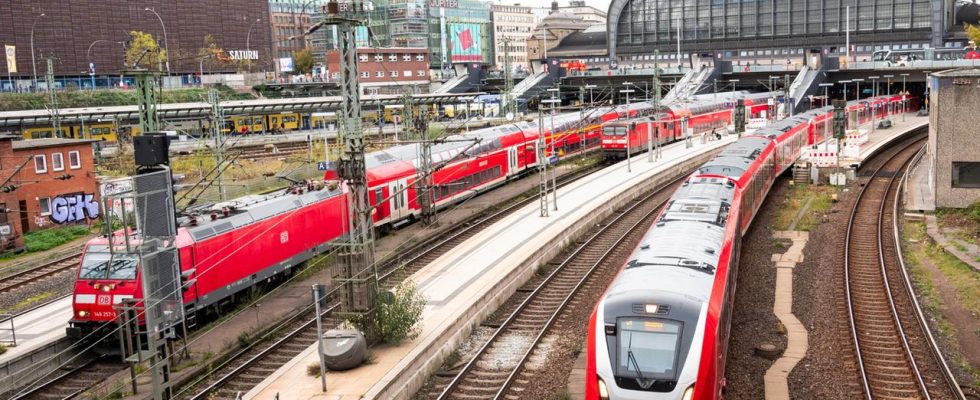In the collective bargaining dispute at Deutsche Bahn, a total of 230,000 employees will be negotiated again from today. A solution should be found by Friday – how could it go on?
Deutsche Bahn (DB) and the railway and transport union (EVG) will continue their collective bargaining negotiations from 2 p.m. today. The talks at the Hotel Intercontinental in Berlin are scheduled for five days up to and including Friday. So far there have been two strikes in the ongoing collective bargaining dispute, and a third call for a warning strike was canceled at short notice after a legal dispute.
The demands of the collective bargaining parties
The EVG has been negotiating with DB and dozens of other railway companies since the end of February about higher wages and salaries for a total of around 230,000 employees. The focus is on the negotiations with DB, where a good 180,000 of these employees work. The union demands from the employers a fixed amount of at least 650 euros per month more or twelve percent for the upper wage brackets. According to their ideas, the term should be twelve months.
During negotiations in Fulda at the end of May, the railways promised a step-by-step increase of twelve percent in the lower wage groups. The middle groups should get a total of ten percent more and the upper groups eight percent. The first stage of the increase should therefore come this year. In addition, there is also a gradual inflation compensation premium totaling 2850 euros, which could be paid tax- and duty-free from this July. The term should be 24 months.
what could happen
The last round of negotiations had lasted three days. The course of the talks in the coming week ultimately also depends on whether there will be new warning strikes on the railways in the near future. In principle, the EVG considers further work stoppages to be possible. “The option for strikes is of course on the table,” said EVG negotiator Kristian Loroch at the end of May.
So there are many conceivable scenarios for the next few days. Should the union have the impression that no progress is being made, the next warning strike on the rails is imminent. If the negotiations are even classified as having failed, a strike ballot, which could then be indefinite, is also conceivable. Of course, it is also possible to conclude the course by Friday.
New labor dispute likely?
According to the political scientist Wolfgang Schroeder, the collective bargaining conflict must always be viewed with a view to the EVG’s competitive situation with the Union of German Locomotive Drivers (GDL). Last Monday, their boss, Claus Weselsky, presented his collective bargaining demands, which he will be negotiating with DB starting in the fall. The key points: 555 euros more per month, three hours less work per week for shift workers and 3000 euros inflation compensation premium.
With that, the GDL set the bar very high, says Schroeder. “And if the EVG were to get involved in the course of the railway management at an early stage, the impression could once again arise that the EVG is the yielding union and the GDL is the demanding union”. This would destroy the impression that the EVG had been trying to create for months, namely that it is the strongest union within the group and that no one else is needed to assert the interests of the employees. Schroeder assumes that there will be another industrial dispute as part of the wage conflict.
The goals of the collective bargaining parties
Because the main points of conflict remain controversial: The EVG has repeatedly made it clear that it wants to achieve a fixed amount instead of a percentage increase. Because the lower income groups should benefit particularly clearly from the collective bargaining round, according to the wish of the trade unionists. Those who earn little have been hit particularly hard by inflation in recent months, because money was often tight even without the sharp price increases at the end of the month. Presumably the union also hopes that more people from these income groups will join the union.
A major sticking point is the long term of 24 months that Deutsche Bahn recently proposed. The EVG wants to start negotiations again sooner in order to be able to react quickly to further price increases in the coming months.
A long term of the collective agreement is important for the railways in order to get more planning security. The group is already struggling with high costs, for example because the ailing rail infrastructure urgently needs to be modernized.

